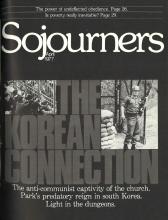An historic battle is going on today among south Korea’s five million professed Christians.
It involves the vast majority of the south Korean Christians who have been provided a convenient half-gospel, and a small minority--remnant of the body of Christ--which discerns the times and dares to live the full risks of the whole gospel.
Today the half-gospel Christians are winning the battle; they have millions of supporters on their side, including the backing of private money, government power, and military might. But one trusts that the remnant church will win the war between truth and untruth; it has one supporter on its side--Jesus the crucified and risen Christ.
The remnant church chooses obedience to God over loyalty to the regime. It did so under Japanese colonial rule before 1945 and does so today. One of the marks of this obedience is great pain--the mental anguish of harassment and imprisonment, the physical scars of beatings and torture. But an equally important sign of obedience is the visible joy; for though the mind can be bent and the body beaten, the spirit is strengthened and continues to overflow its human vessels. When these people worship, they can know which two or three or five or six “worshippers” are really observers from the Korean Central Intelligence Agency: the men with the dry eyes when the service ends.
Read the Full Article

